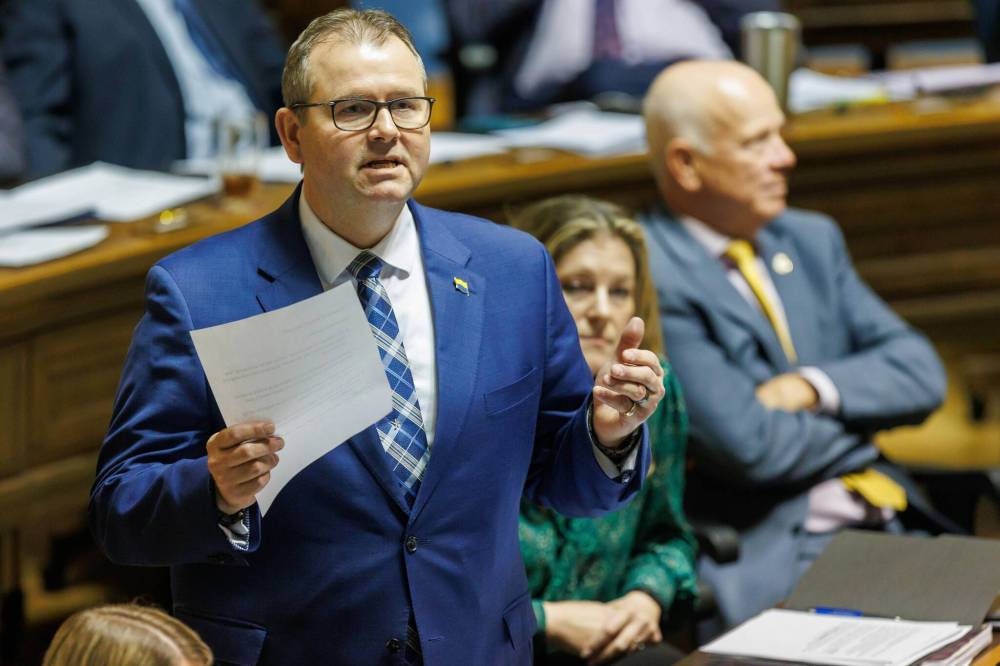Classroom confidential Despite promises of improving school safety and transparency, child protection experts say Manitoba’s new teacher registry conceals more than it reveals
Read this article for free:
or
Already have an account? Log in here »
To continue reading, please subscribe:
Monthly Digital Subscription
$0 for the first 4 weeks*
- Enjoy unlimited reading on winnipegfreepress.com
- Read the E-Edition, our digital replica newspaper
- Access News Break, our award-winning app
- Play interactive puzzles
*No charge for 4 weeks then price increases to the regular rate of $19.95 plus GST every four weeks. Offer available to new and qualified returning subscribers only. Cancel any time.
Monthly Digital Subscription
$4.99/week*
- Enjoy unlimited reading on winnipegfreepress.com
- Read the E-Edition, our digital replica newspaper
- Access News Break, our award-winning app
- Play interactive puzzles
*Billed as $19.95 plus GST every four weeks. Cancel any time.
To continue reading, please subscribe:
Add Free Press access to your Brandon Sun subscription for only an additional
$1 for the first 4 weeks*
*Your next subscription payment will increase by $1.00 and you will be charged $16.99 plus GST for four weeks. After four weeks, your payment will increase to $23.99 plus GST every four weeks.
Read unlimited articles for free today:
or
Already have an account? Log in here »
Hey there, time traveller!
This article was published 27/06/2025 (196 days ago), so information in it may no longer be current.
Behind the education degrees and the lesson plans, dark secrets can lie hidden.
These are teachers, entrusted with guiding hundreds of children through their formative years. But in some cases, they are also sex offenders, child-pornography collectors and distributors, scam artists. Some, even murderers.
This disturbing reality within the education system is one the Manitoba government has been reluctant to fully disclose to the public.
Despite promises that a new teacher registry launched at the start of the year would enhance transparency within the education system and improve children’s safety, critics have dismissed it as weak, opaque and inferior to those in use in other provinces.
A Free Press investigation confirms those concerns.
The online registry, launched on Jan. 6, allows the public to search thousands of names to find out a teacher’s certification date and current standing, dating back to 1960. No additional information is provided.
A separate list on the registry web page, headed “Disciplinary Outcomes” and currently including 115 names, identifies teachers with suspended or cancelled certificates and the year they were revoked, dating back to 1990. Again, no additional information is provided.
To fill these gaps, the Free Press spent weeks going through criminal and civil court documents, as well as decades of archival news clippings, to determine why those teachers had their certificates cancelled or suspended over the past 35 years.
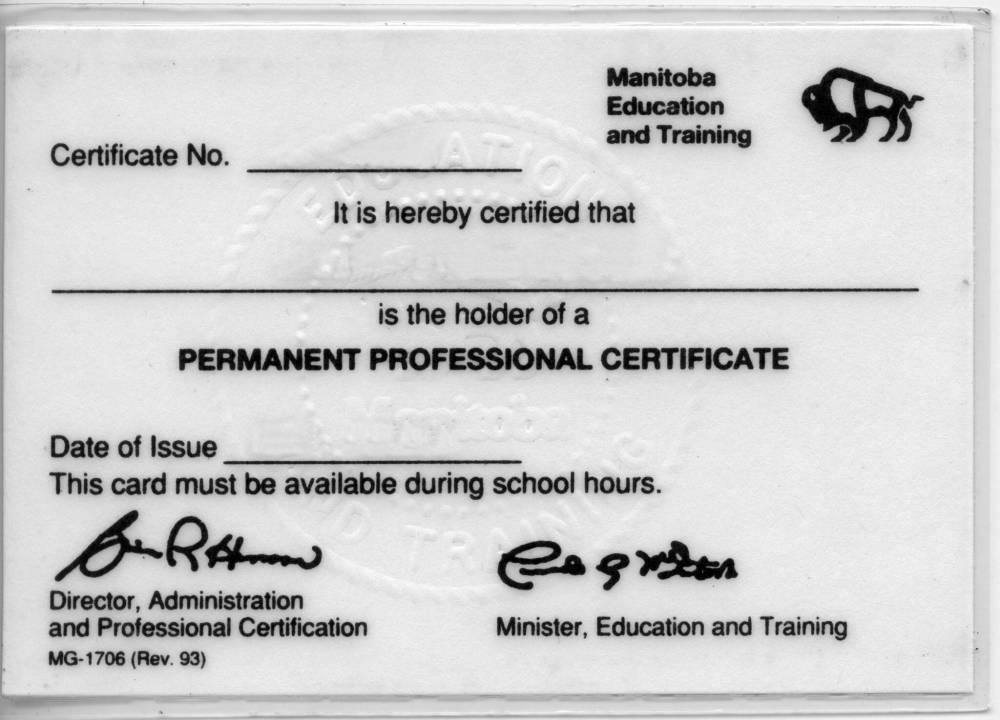
The findings are disturbing: at least 50 teachers have been charged and convicted of sex crimes against minors: 23 for sexual assault; 11 for child pornography-related charges; 15 for sexual interference and/or sexual exploitation; and four for luring.
Beyond sexual predation, the investigation exposed other serious breaches of trust. One former teacher defrauded individuals of millions of dollars; two others received prison sentences in separate second-degree murder cases; another was convicted of manslaughter after suffocating an 11-year-old boy who had mental and physical disabilities.
But many cases, including ones involving drug trafficking, child pornography and sex-assault convictions, have only resulted in suspended licences, even though the crimes occurred years ago.
Then there are teachers who were convicted of sex-related charges whose licences were initially suspended but who are now in good standing.
Also troubling, the Free Press discovered that the names of teachers in at least four historical cases involving sex-related crimes against minors — along with a confessed molester who was never formally charged — do not appear on the disciplinary outcomes list as it only includes educators who held a certificate after Jan. 1, 1990.
Inexplicably, those same teachers are also absent from the general registry, despite receiving teaching certificates after 1960.
Disciplinary decisions remain murky today. The licence of a teacher who was sentenced to five years in prison last fall for sexually assaulting a 15-year-old boy is still in good standing while she appeals her conviction.
However, a teacher charged with sexual assault, exploitation and luring of a teenage girl this spring had his licence immediately suspended even though his case is still before the courts.
Finally, a subset of teachers, those who are granted permission to teach without possessing a certificate, is not covered by the legislation.
The dearth of official information, coupled with the Free Press’s findings, casts a shadow over the registry’s integrity, raising a fundamental question: does this new system serve any purpose beyond providing the most basic database of names?
For those who have dedicated their lives to protecting children from sexual predators, the answer is no.
It was hardly an auspicious debut. Shortly after the province’s online teacher registry went live, University of Manitoba law professor Brandon Trask attempted to access it on his smartphone. It failed to load.
Months later, during an interview, he got the same result.
JESSICA LEE / FREE PRESS FILES University of Manitoba law professor Brandon Trask says the new teacher registry falls well short of its stated goal to improve transparency and better inform parents.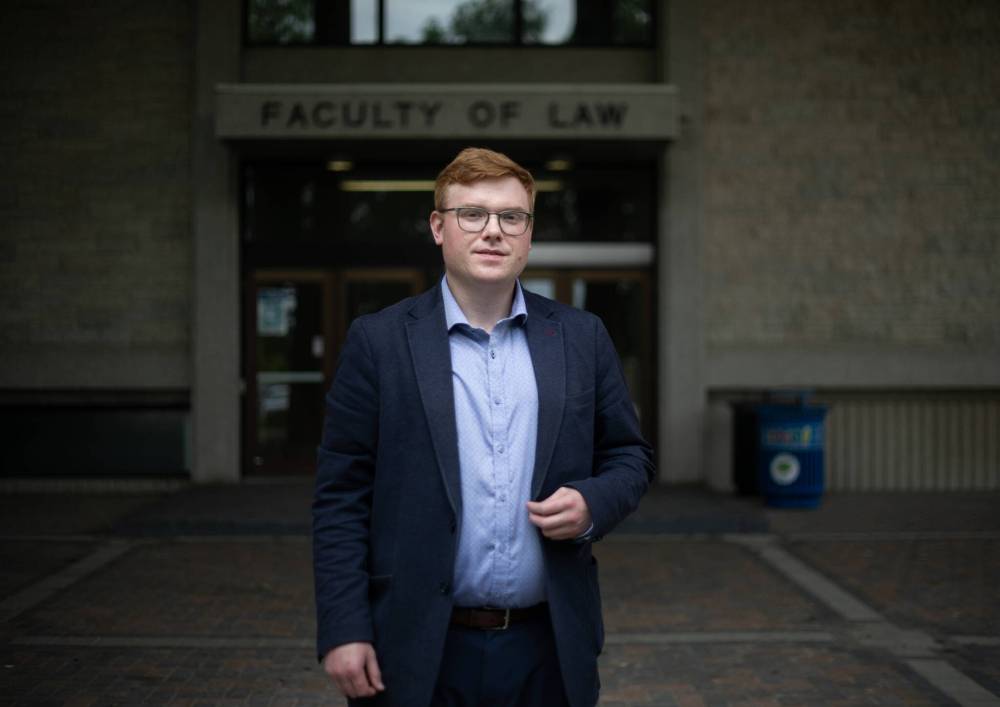
“Just did it again now and same thing,” he said, before switching from his iPhone to a desktop computer. “Then you get onto it, and you start to notice some other things right away.”
By restricting information to given and last names, along with the status of a teacher’s certificate, the registry falls far short of its stated goal of improving transparency in classroom oversight and of better informing families about the individuals responsible for their children’s education, said Trask, a former Crown attorney.
“If I were a parent who had a child assigned to a class or homeroom, under the purview of somebody on this list, I would want a lot more information,” he said.
And then there’s the disciplinary outcomes list.
“It’s just so bizarre,” Trask added. “Some names are suspended and others cancelled. If somebody has been suspended for 27 years, what’s even the difference between a suspended and cancelled certificate?”
These discrepancies also drew sharp criticism from Cameron Hauseman, a University of Manitoba education professor.
University of Manitoba education professor Cameron Hauseman criticized inconsistencies in the registry.“The province should answer for these inconsistencies in the registry,” he said. “I don’t know why they would release things in this beta version … because it just leads to more and more questions about the competency of this government and of the province when it comes to education in a broader sense.
“If they can’t get a registry right, what other important issues, when it comes to K to 12 education, are going to be fumbled by this government?”
Education Minister Tracy Schmidt did not mince words when presented with the Free Press’s findings this week — that at least 50 teachers over the last 35 years have been convicted of sex-related crimes against minors.
“It’s horrifying,” she said. “Pick the strongest word in your vocabulary. It’s more than unacceptable.
“It’s something that we need to do better on. Not just better; it’s something that we need to make sure can never happen again.”
“It’s something that we need to do better on. Not just better; it’s something that we need to make sure can never happen again.”–Education Minister Tracy Schmidt
However, she defended the government’s registry, saying it’s a significant improvement over a previous secretive practice. And when more information becomes available “kids ultimately will be better off for it,” she said.
“I can’t erase the sins of the past,” Schmidt said. “There have been sins, you and I both know it, the survivors know it better than anybody.
“We are committed to doing better, and on a go-forward basis, as the independent commissioner starts doing her work, there will absolutely be great use and great value of this teacher registry.”
Despite the Free Press’s findings, Schmidt, Trask and others interviewed for this story stressed the vast majority of Manitoba teachers are caring, competent professionals.
JOHN WOODS / FREE PRESS Education Minister Tracy Schmidt says the new teacher registry is a significant improvement over what previously existed, despite its glitches and oversights.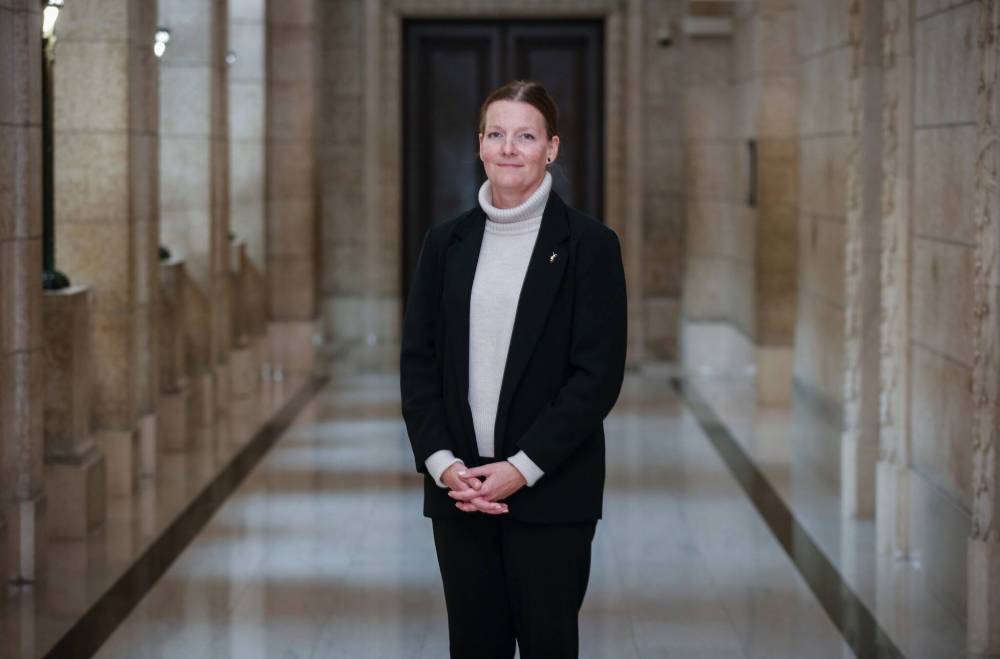
Ontario’s registry, which is overseen by that province’s teachers’ college, is considered the gold standard in Canada. It held its first public teacher-misconduct hearing in 1998.
Ontario teaching licences can be revoked on multiple grounds: professional misconduct, which includes inappropriate relationships with students, dishonesty, and behaviour that is unbecoming of the teaching profession; incompetence; or incapacity.
Revocation of a licence is mandatory when an educator is found guilty of sexual assault and prohibited acts involving child pornography.
Even in cases that are not criminal, detailed reports outlining the professional misconduct — such as a substandard classroom teaching environment, failing to notify child welfare agencies of children at risk, and anger-management issues — have resulted in disciplinary decisions.
Penalties can range from temporary suspensions without pay to verbal reprimands, to being required to take remedial professional training, with all decisions available to the public.
B.C., Alberta and Saskatchewan have similar teacher registries where findings of misconduct, whether criminal or professional, are detailed and hearing dates are posted.
New Brunswick’s isn’t as extensive, but it does list reasons — such as pleading guilty to criminal charges or serious professional misconduct — when a licence is revoked.
Sara Austin has advocated for children’s rights for most of her life. She worked for years for Calgary’s Luna Child and Youth Advocacy Centre — formerly known as the Sheldon Kennedy Advocacy Centre, named after the former Manitoba junior hockey player who exposed the Graham James sex scandal — before establishing her own organization, Children First Canada (CFC).
Austin commends the Manitoba government for catching up to other jurisdictions, but questions why it has fallen to the Free Press to dig up critically important information and why the registry is devoid of disciplinary decisions concerning professional misconduct.
“Kids spend more waking hours with their teachers than they do with their parents,” Austin said. “We want to know that when we hand our kids over in the morning and pick them up at the end of the day, that they have been in good, safe hands and with people that we can trust.”
She added: “That is the most basic thing we should be providing to our students, and what this data shows is we’re not doing our best to guarantee them that safety.”
“We want to know that when we hand our kids over in the morning and pick them up at the end of the day, that they have been in good, safe hands and with people that we can trust.”–Sara Austin
Austin was not surprised by the number of Manitoba teachers who have been criminally charged and, in many cases, convicted, particularly for sex crimes against children.
However, she warned that the true number is actually higher, citing the difficulties of getting victims to come forward and trusting the criminal justice system where proving beyond a reasonable doubt often comes down to one person’s version of events against another’s.
“It’s confirmation of what we know to be true, that any system that exists to provide care or support for children is vulnerable to having people come into it with the intent to access children and abuse them,” Austin said.
BROOK JONES / FREE PRESS Recent Windsor Park Collegiate graduate and student-safety advocate Landon Sanderson said the new provincial teacher registry’s launch was done so quietly students and educators were initially unaware it even existed. 
Landon Sanderson, newly graduated from Winnipeg’s Windsor Park Collegiate, has served on the Youth Advisory Council with Austin’s organization for several years, advocating for student safety and rights.
Open discussions surrounding teacher conduct and accountability are directly tied to those issues, yet because Manitoba’s registry was launched so quietly, he was unaware it even existed. At no point in the school year did it come up in talks between his teachers and fellow students, he said.
He’s not alone. The Free Press spoke to dozens of parents and students who were unaware of the registry’s launch.
A fully public registry that documents patterns of misconduct is fundamental in ensuring student safety, because it not only holds teachers accountable but can also identify questionable behaviour that might go unnoticed, Sanderson said.
The registry as it exists offers no value because those teachers have already been removed from the profession, he said.
“Having the records of teachers who have been convicted of any crimes or sexual assaults or those types of things that are glaringly obvious, that person is not going to be a staff member and they’re never going to be around children,” he said.
“It’s the little things that trickle down, like text messaging students, or certain relationships they may create. It’s helpful, because when a student comes home and says, ‘Hey, I’m texting,’ or ‘I have this phone number of this teacher,’ the parent now has the opportunity to look into that a little bit more and maybe a parental instinct would kick in and say, ‘That’s a little weird.’”
But with that information currently unavailable, parents might miss early warning signs, Sanderson said.
“Because as much as teenagers like to think that we are all that and powerful and we know what we’re doing, we are vulnerable, sometimes gullible, and we don’t know or recognize wrong behaviours until after it already affected us,” he said.
When the Progressive Conservative government passed Bill 35 in the spring of 2023, it was viewed as a major victory by child advocacy groups, marking a long overdue step toward making the classroom safer.
The bill’s passage coincided with an increase in teachers facing charges for sex-related crimes against children. A 2022 report by the Winnipeg-based Canadian Centre for Child Protection (C3P) revealed that 500 students nationally were sexually victimized (or allegedly victimized) by more than 250 school personnel between 2017 and 2021.
Then-education minister Wayne Ewasko said his government was concerned about the increasing number of sex-related cases involving teachers through the 2000s and saw Bill 35 as a means “to help see the red flags and help protect kids.”
As education minister, he said he suspended and cancelled teaching certificates for behaviours he categorized as “huge stuff,” but couldn’t provide specifics because of privacy issues.
During the 21 months Ewasko served as education minister, the Free Press determined he cancelled a certificate belonging to a former First Nation school principal who was sentenced to life in prison for the vigilante killings of two drug dealers.
He also dealt with a teacher who was charged with sexual assault and sexual interference, with police alleging the educator forced a student into a relationship over seven months. Although those charges were stayed, his certificate was still cancelled.
Four other teachers during this time period also agreed to relinquish their licences after their sex-related charges were stayed.
Former education minister Wayne Ewasko introduced Bill 35 when the Progressive Conservatives were in power.The NDP, which formed government later in 2023, pledged to enforce the legislation, though it has since been watered down.
Bill 35 called for the creation of an independent commissioner to oversee complaints from the public and the online teacher registry. Under the new legislation, disciplinary processes and outcomes are to be made public, with hearings conducted by a three-person panel representing the broader community.
However, in the six months since the registry’s implementation, little discernible progress appears to have been made.
The government has released no information regarding the number of investigations initiated by the commissioner or on hearings that have taken place since its launch.
No outcomes have been publicized, aside from a note accompanying the names of three teachers added to the disciplinary outcomes list, indicating they were dealt with through the previous review process.
Prior to Bill 35, complaints against teachers were primarily handled at the school-division level or internally by the Manitoba Teachers’ Society, unless they became criminal matters.
Because the MTS, the union that represents 16,000 educators, did not publicly disclose complaints or disciplinary decisions, information regarding misconduct was limited to media coverage of court cases.
Critics argued the former secretive system was deeply flawed, pointing to a clear conflict of interest inherent in a union investigating its own members. The lack of transparency did little to inform families or protect children, and the process was viewed as heavily favouring the rights of teachers over students.
RUTH BONNEVILLE / FREE PRESS Mary Lobson, CEO of Respect, Educate and Empower Survivors, says the province’s new teacher registry is not adequately trauma-informed or user-friendly for those seeking vital information.
Mary Lobson, CEO of REES (Respect, Educate and Empower Survivors), knows all too well the challenges of establishing a transparent reporting mechanism.
Through REES, Lobson provides abuse survivors with an anonymous, trauma-informed approach for reporting incidents and connecting with support services. For example, users can make a secure, private record of an incident — with no expectation of reporting it immediately — to provide them time to process what happened.
The reporting system is currently being used by several Manitoba universities and sports leagues.
Based on her experience, Lobson has a strong opinion about Manitoba’s teacher registry. She takes immediate issue with the online public complaint form.
“When I click ‘save,’ it does nothing. If I click ‘print,’ it does nothing,” Lobson said, working with the Safari search engine on her desktop computer. “So, the form, as it exists here right now, isn’t even a functional form.”
When it is operational, it’s clunky and doesn’t provide basic features such as drop-down options for information about the specific division or school where an incident took place, she said.
A system that is easy to navigate and accessible is not only beneficial to a parent or student during an emotional time, it also helps the government track data and identify trends that may require additional policies, resources and prevention efforts, Lobson said.
Not including information about community-based resources, such as the Suicide Crisis Hotline, was also a lost opportunity, she said.
“It’s just not trauma-informed or user-friendly,” Lobson added.
“It’s just not trauma-informed or user-friendly.”–Mary Lobson
Her concerns are also quite personal.
Years ago, while considering a school transfer for her son, she almost placed him in the care of a teacher who would later be exposed as a sexual predator.
“It hits home for me,” Lobson said. “I approach this work as someone who’s done this work for a long time, but it has become very personal when we now have technology that can easily be put in place to identify someone who causes harm to people.”
As director of education with C3P, the organization that conducted the 2022 national report on teacher sexual misconduct, Noni Classen was initially excited about the online registry.
“This mechanism is an incredible opportunity for Manitobans; they’ve been waiting for it. Survivors, victims, parents and school communities are relying on this,” Classen said. “What has been laid out in the legislation is not, in fact, what they’ve currently created and what is accessible. There is a disconnect here, and it’s not enough.”
Based on the investigation’s findings, it became clear the Manitoba school system has depended heavily on the courts to determine disciplinary outcomes.
The Free Press analysis revealed that at least 76 of the 110 teachers with suspended or cancelled certificates (five educators on the discipline outcomes list are currently in good standing) have been charged and/or convicted of a criminal offence, with at least 50 of those convicted of sex-related crimes against minors.
The Free Press could not find any public document connected to the 34 remaining teachers on the disciplinary list.
Of those, 19 had their certificate suspended or cancelled prior to 2001, which, due to provincial court search limitations, could not be found without knowing the exact date of their court appearance. The remaining 12 lost their licences within the past six years, with eight in the last three years.
Between 2001 and 2018, of the 39 teachers whose certificate was suspended or cancelled, all but three were confirmed to occur in the wake of criminal charges, rather than being identified proactively for breaches of professional standards and codes of conduct.
MIKAELA MACKENZIE / FREE PRESS FILES Noni Classen, director of education with the Winnipeg-based Canadian Centre for Child Protection, says the new online teacher registry falls short of what the legislation creating it had aimed for and outlined.
It’s why Classen has repeatedly stressed to education officials the need for a different threshold to identify problem teachers.
“There are other types of misconduct that don’t hit the threshold of Criminal Code offences that are still incredibly harmful to children, and it is the opportunity to disrupt something from becoming more devastating,” she said.
She hopes the registry will begin to reflect those problematic behavioural issues — such as a teacher exchanging texts with a student or a coach inappropriately massaging a player — though they appear to still be managed at the division or school level and off the public radar.
“Right now, everything is buried,” she said. “There’s nothing accessible about the system, currently, and nobody knows about it. It’s about making sure there’s communication with school boards, with schools, that it’s being communicated with parents and that there’s a plan, there’s a strategy around this. These are the things that are going to start to rebuild the public trust.”
For Christy Dzikowicz, executive director of the Toba Centre for Children and Youth, the effectiveness of the registry will only become apparent when more teachers are flagged for inappropriate behaviour.
“The measure of success of the system in place is when the number of misconduct hearings — the number of teachers being removed from positions because of behavioural misconduct — exceeds, by far, the number of criminal convictions,” Dzikowicz said.
“That’s how you’ll know what’s being put in place is working, because when we see the Kelsey McKays of the world, it’s already too late — severe damage has already been done.”
The sexual and psychological abuse Kelsey McKay’s victims endured is a stark reminder of the consequences of keeping teacher discipline behind closed doors.
In April 2022, McKay, a former teacher and football coach at Churchill High School and then later at Vincent Massey Collegiate, was charged with sexually abusing nine players. McKay pleaded guilty to nine counts of sexual assault and two counts of luring in July 2023 — just weeks after Bill 35 officially passed — before he was handed a 20-year prison sentence last October. His legal fees were covered by the union.
Max Jenson came forward after suffering abuse in the mid-2000s while a student at Churchill. Now 34, he lives with the trauma from the assaults, a pain he expects to navigate for the rest of his life.
Jenson had his name lifted from the McKay court case publication ban and has spent the last several months working with key players in the public school system, including Schmidt. A significant part of his advocacy involves sharing his experience.
McKay befriended Jenson in Grade 10 when he was 15 years old. Their relationship led to McKay taking Jenson off school grounds at lunchtime and inviting him to his home in the evenings.
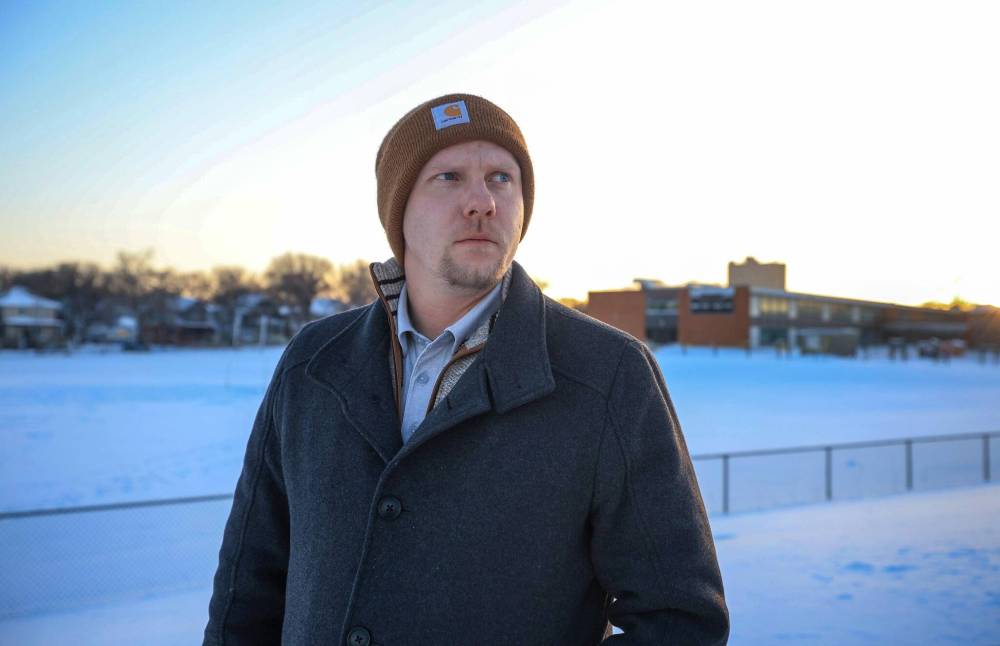
As McKay continued to cultivate Jenson’s trust, their conversations became more personal, including McKay discussing sexual encounters with other men. McKay abused Jenson for the first time not long after that.
An effective registry, much like Ontario’s, which publicly details misconduct and states corrective actions, would have documented McKay’s escalating infractions and informed parents and students of his inappropriate behaviour, Jenson said.
“Any information that is in regard to child safety, any violation that puts a child at risk, should be made available, because the public has a right to that information…,” he said.
“Having a registry with his name on it, saying his certificate is cancelled, does absolutely nothing.”
“Any information that is in regard to child safety, any violation that puts a child at risk, should be made available, because the public has a right to that information.”–Max Jenson
In 2016, three sets of parents lodged complaints about McKay with Vincent Massey Collegiate.
He had been behaving erratically at practices, subjecting players to verbal abuse. Some students reported he was constantly texting them, asking them to come to his home; on at least one occasion, he talked about his sexuality.
Despite parents raising their concerns with Pembina Trails superintendent Ted Fransen, little action was taken. McKay was ordered to complete the Respect in Sport course (for a third time), as well as the Commit 2 Kids program, designed to help mitigate the risk of sexual abuse and create safe environments for children.
McKay was also instructed to review the division’s policy on staff interaction with students and to stop texting students. He didn’t.
With scant information in the new registry, the province and the education system are not only failing to address ongoing problems in schools, but their inaction suggests they do not consider it to be an issue in the first place, Jenson added. Or worse, he said, they are deliberately concealing the full extent of it.
“I feel that the government is protecting an entity from abuse that has transpired over decades,” Jenson said. “We say that schools are a safe place, and schools should be safe and child safety should be the No. 1 priority of our educators.
“But when these horrendous crimes and these actions take place, and when legislation is introduced in order to protect these children and then measures are taken to prevent the information from being shared, the protection of the entities, such as the school system, clearly outweighs child safety.”
The omission of historical cases from the disciplinary outcomes list amplifies Jenson’s fears.
Tom Easton, a popular teacher in the St. James School Division, abused several students during his 20-year career between Silver Heights and John Taylor Collegiate. The abuse ended only after he resigned amid allegations of inappropriate conduct in the late 1980s.
The incidents, reported by former students, came to light in a previous Free Press investigation. Although Easton was never charged, he confirmed many of the details with this reporter.
Easton submitted his letter of resignation to the St. James School Board while a Department of Education investigation was ongoing in 1988 — two years before Bill 35’s cutoff for disciplinary outcomes. Owing to the timing, Easton doesn’t show up on either registry list.
Another former teacher who’s not on the list admitted to police he had put his penis between a 13-year-old student’s legs but claimed he didn’t have sex with her because she was on her period.
Two more examples of teachers missing from the registry include a Killarney junior high school teacher charged with eight sex-related charges — two counts of sexual assault and six counts of indecent assault — following a year-long RCMP investigation; and a former Winnipeg educator who was charged and convicted — and then later acquitted on appeal — of raping a woman in her mid-20s in her car following a night of drinking.
“That’s horrifying,” Classen said. “Another reason why the registry is really important is because there’s also an element of holding people accountable, within the public sphere, and that is also important for the validation and the healing of those that have been harmed.”
For student-safety advocates, the province’s new teacher registry falls well short of its stated goals of improving transparency and better informing parents of educator misconduct.There are two cases involving sex-related crimes against minors in which the teachers were convicted before eventually having their certificates returned to good standing.
One of those teachers pleaded guilty to sexual touching for her role in allowing an ex-RCMP officer to have sexual intercourse with a pre-teen at the educator’s home while she took photographs. She was fined $1,000 and was placed on supervised probation for three years.
The other teacher was charged with sexual assault for keeping a 10-year-old girl after class and touching her twice through a hole in her pants. He was given a one-year conditional discharge.
It’s likely more historical cases are missing. During the late 1980s, provincial legislation was introduced to automatically suspend teachers charged with sexual abuse against minors after a spate of cases surfaced. At the time, the Free Press documented more than 20 cases of teachers charged for sexual abuse of minors.
The law was only in place for a few months. It was dropped following pressure from the MTS over what they argued was a lack of due process.
Although unaware of the historical gaps in the registry until informed by the Free Press, Schmidt said she is committed to following up on the findings and correcting any missing teacher profiles.
“As you can appreciate, this registry is new,” she said. “We are often dealing with historical record keeping and information that’s not always, quite frankly, entirely accurate, entirely whole.
“We’re dealing with records that sometimes are on microfiche. So, our department has been working diligently to make sure that the registry is accurate.”
In September 2024, the Manitoba government named Bobbi Taillefer as the registry’s independent commissioner, with then-education minister Nello Altomare praising her as being “beyond reproach.”
The hiring of the longtime union leader immediately drew fire from the Opposition who questioned the independence of an office led by a “heavily aligned individual.”
Former education minister Ewasko, who introduced Bill 35 when the governing Progressive Conservatives were in power, said he was stunned by Taillefer’s appointment.
When the bill was being brought forward, he said he was on the same page as child-safety experts who argued the commissioner should come from outside the public school system to ensure the rights of both teachers and students are equally protected.
“You don’t want to be judge and jury and executioner, right? You want to get away from that, too, because then, right away, you get the axes and pitchforks,” Ewasko said.
“You’ve got the commissioner in place to make an unbiased decision, to then take it forward to the panel and have that shoulder-checked….”
“Then when I found out who was the commissioner, I was like, ‘come on.’”
Schmidt defended the hiring, saying Taillefer brings years of professionalism and expertise to the role.
Taillefer spent 21 years at the Manitoba Teachers’ Society, eventually serving as general secretary — the highest staff position.
In previous MTS roles, she had direct involvement with disciplinary cases on behalf of union members. Notably, she was at the helm of the MTS when concerns about McKay’s erratic behaviour first emerged. (When asked about the MTS’s involvement at the time, Taillefer directed questions to the union.)
After leaving the MTS in 2018 for leadership roles with teacher federations in Ontario and then Saskatchewan, Taillefer was sworn in as Manitoba’s commissioner on Jan. 6.
“This is high stakes, where you take all of the interests into consideration and you’re making sure that students are protected.”–Bobbi Taillefer
In what critics called a serious conflict of interest, she continued to lead the Saskatchewan teachers’ union for several more weeks. It only came to light after being reported by the Free Press.
While acknowledging the union fights vigorously for its members, Taillefer maintained she always advocated for due process, and dismissed the criticism of her appointment, saying it comes with the job.
However, she said her time as a teacher “brings a certain experience to be able to understand what these situations are, and I think it’s an enhancement.”
As commissioner, Taillefer can initiate preliminary and full investigations. Plus, she has the authority to issue suspensions where she “wouldn’t necessarily feel like the person has given us adequate assurances that they’re not going to seek employment as a teacher.”
“It’s speedier than having to work through a consent resolution,” she said. “But this is high stakes, where you take all of the interests into consideration and you’re making sure that students are protected.”
She stressed she doesn’t have a say when a complaint reaches the disciplinary hearing stage; her role is only to direct investigations to a panel.
Despite that, Taillefer does have the ability to dismiss cases before they’re investigated. It’s a power she’s claimed to have used already, though she wouldn’t provide specifics.
Her office has dealt with 13 complaints so far, according to Schmidt’s office, and although there has yet to be a formal hearing, Taillefer expects one “will happen in the next little while.”
This week she submitted her first summary report, which covered the registry’s first three months. The government has 45 days to release it.
When asked about the gaps in historical cases, the possibility of searching for more and the status of decades-old suspensions, Taillefer stressed her mandate began Jan. 6 and is about the future, not the past.
“I can’t speak to that. I have no information,” she said.
Her position runs counter to Schmidt’s, who said “these are the type of investigations that (Taillefer) can proceed upon on her own volition, to be quite frank.”
Bobbi Taillefer
As for the scant information in the registry, Taillefer said she was operating within the existing legislative framework, and providing additional information was not her role. However, she said her office is seeking further legal opinion on what can be included.
Schmidt also indicated the government is open to making changes to improve transparency, though she said it has to balance other factors, including privacy, procedural fairness and legal issues.
In response to criticism that the online complaint form is clunky, not trauma-informed and incompatible with certain browsers, Taillefer said she would find out more about those issues plaguing the registry’s interface.
While her office has improved the reporting form’s language based on feedback from frustrated users, it did not consult with child-advocacy groups on the wording or layout, nor had it considered that technical hurdles could deter victims from reporting incidents.
Additionally, her office did not launch education campaigns for parents and the public, Taillefer said, instead focusing on educating school divisions, superintendents and HR personnel on reporting procedures.
“I’m not going to show up at baby shows or home-improvement shows and say, ‘Do you know about this?’” she said. “What we’ve worked on very hard is to make the process really clear.”
Taillefer’s reliance on working through education insiders reinforces the notion teacher discipline is still operating behind closed doors, Classen said.
“That was the point of the importance in having — and why we pushed for — an independent commissioner outside of the MTS, outside of school boards, outside of schools, because there’s always going to be those blind spots because they work every day with these people,” she said.
“They’re friends with them, but they can also be groomed by these people.”
The Free Press sent a detailed email with specific questions to the MTS for comment. The union did not answer them directly, but instead provided a general response saying it has full confidence in Taillefer as commissioner and that it’s open to ideas for improvement but expects to be consulted “well in advance by government on any proposed changes or tweaks to the structure and processes.”
“The Manitoba Teachers’ Society does not hire, fire, nor discipline teachers. We do not run the government’s teacher registry. We do not comment on personnel cases,” MTS president Lillian Klausen said in the statement.
As part of the Free Press investigation, a search for “Bobbi Taillefer” on the registry yielded no results for the former teacher. Her name is only found under previous married and maiden names.
The discovery took Taillefer by surprise.
“My name isn’t?” she said. “Why not?”
The U of M’s Trask said the apparent failure of the commissioner to ensure her own profile was easily searchable casts serious doubt on the entire registry.
“That is absurd,” he said. “It’s hugely problematic that somebody who is the public face of the list, and would be known to be on the list, can’t actually be found on the list without having done a bunch of background information (searching) to figure out previous names or previous aliases.
“How many other names are incorrect? Dozens? Hundreds? Thousands?”
jeff.hamilton@freepress.mb.ca

Jeff Hamilton
Multimedia producer
Jeff Hamilton is a sports and investigative reporter. Jeff joined the Free Press newsroom in April 2015, and has been covering the local sports scene since graduating from Carleton University’s journalism program in 2012. Read more about Jeff.
Every piece of reporting Jeff produces is reviewed by an editing team before it is posted online or published in print — part of the Free Press‘s tradition, since 1872, of producing reliable independent journalism. Read more about Free Press’s history and mandate, and learn how our newsroom operates.
Our newsroom depends on a growing audience of readers to power our journalism. If you are not a paid reader, please consider becoming a subscriber.
Our newsroom depends on its audience of readers to power our journalism. Thank you for your support.
History
Updated on Friday, June 27, 2025 1:25 PM CDT: Adds details of certificate cancellations


